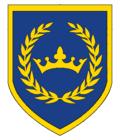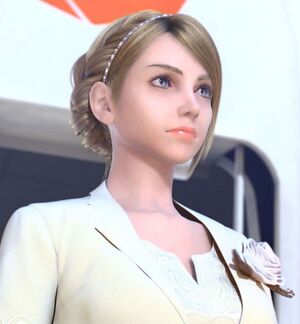Monarchy of Brumen: Difference between revisions
mNo edit summary |
No edit summary |
||
| Line 39: | Line 39: | ||
| website = <!-- Optional. --> | | website = <!-- Optional. --> | ||
}} | }} | ||
The '''monarchy of Brumen''', commonly and constitutionally referred to as '''The Crown''' ({{wp|Hessian dialiects|Brumenese}}: ''Die Krone''), is the constitutional institution by which a {{wp|Hereditary monarchy|hereditary monarch}} reigns as the ceremonial {{wp|head of state}} of the [[Brumen|Kingdom of Brumen]]. It is the highest office in the Kingdom and is vested with certain executive powers which are collectively referred to as the [[Reserve Powers of the Crown (Brumen)|reserve powers of the crown]]. In practice | The '''monarchy of Brumen''', commonly and constitutionally referred to as '''The Crown''' ({{wp|Hessian dialiects|Brumenese}}: ''Die Krone''), is the constitutional institution by which a {{wp|Hereditary monarchy|hereditary monarch}} reigns as the ceremonial {{wp|head of state}} of the [[Brumen|Kingdom of Brumen]]. It is the highest office in the Kingdom and is vested with certain executive powers which are collectively referred to as the [[Reserve Powers of the Crown (Brumen)|reserve powers of the crown]]. In practice the monarch is bound by {{wp|Constitutional convention (political custom)|convention}} to exercise their reserve powers upon the advice of the [[Chancellor of Brumen|chancellor]], though there is no constitutional basis for the monarch to do so. While the constitution establishes the monarch {{wp|commander-in-chief}} of [[Grand Army of the Realm|Brumen's Armed Forces]], in practice it is the chancellor that directs the armed forces on behalf of the monarch through {{wp|royal assent}}. All soldiers of the Grand Army of the Realm swear allegiance to the monarch and the government of Brumen is officially called Her Majesty's Government. | ||
In spite of its status as a ceremonial head of state, the monarch may at times exercise considerable powers through subtle means. For example, while the [[Constitution of Brumen|constitution of Brumen]] outlines that the monarch should provide {{wp|Royal assent|royal assent}} bills or legislation approved by [[Parliament of Brumen|parliament]], it does not specify when the monarch must do so. There has been times when the monarch has purposefully delayed providing their royal assent to controversial bills and pieces of legislation, prompting the chancellor and [[Parliament of Brumen|parliament]] to rework the bill. The current Monarch is [[Anne-Marie I]] who ascended to the throne when her father, [[Sebastian VII]], abdicated on 15 April 2020. | In spite of its status as a ceremonial head of state, the monarch may at times exercise considerable powers through subtle means. For example, while the [[Constitution of Brumen|constitution of Brumen]] outlines that the monarch should provide {{wp|Royal assent|royal assent}} bills or legislation approved by [[Parliament of Brumen|parliament]], it does not specify when the monarch must do so. There has been times when the monarch has purposefully delayed providing their royal assent to controversial bills and pieces of legislation, prompting the chancellor and [[Parliament of Brumen|parliament]] to rework the bill. The current Monarch is [[Anne-Marie I]] who ascended to the throne when her father, [[Sebastian VII]], abdicated on 15 April 2020. | ||
== History == | == History == | ||
== Constitutional Role == | == Constitutional Role == | ||
Article I of the [[Constitution of Brumen|constitution of Brumen]] establishes the monarch as the living symbol and sovereignty of the Kingdom, the use of the monarch's profile in the country's currency (the Bon), is the clearest interpretation of the aforementioned article. Monarchs are expected to become the guarantors of the constitution, this vests them with certain reserve powers to allow them to carry out this task. Historically monarchs of Brumen have ruled as an {{wp|absolute monarchy|absolute monarch}} where all executive and legislative power are concentrated within the monarch. Since its establishment the powers of the monarch have been drastically reduced to its modern form as a ceremonial head of state, fulfilling mostly non-partisan appointment functions. However in spite of these changes, the monarch continues to wield significant reserve powers though none has been explicitly exercised since the end of the Second Insurrection. Examples of the monarch's reserve powers include: | Article I of the [[Constitution of Brumen|constitution of Brumen]] establishes the monarch as the living symbol and sovereignty of the Kingdom, the use of the monarch's profile in the country's currency (the Bon), is the clearest interpretation of the aforementioned article. Monarchs are expected to become the guarantors of the constitution, this vests them with certain reserve powers to allow them to carry out this task. Historically monarchs of Brumen have ruled as an {{wp|absolute monarchy|absolute monarch}} where all executive and legislative power are concentrated within the monarch. Since its establishment the powers of the monarch have been drastically reduced to its modern form as a ceremonial head of state, fulfilling mostly non-partisan appointment functions. However in spite of these changes, the monarch continues to wield significant reserve powers though none has been explicitly exercised since the end of the Second Insurrection. | ||
* | === Reserve Powers of the Crown === | ||
* | The reserve powers of the Crown is the umbrella term for functions and duties that were not specifically transferred to the chancellor or other government offices and remain under the authority of the monarch. The monarch's reserve powers are divided into two major components: ceremonial powers & temporal powers. The former largely applies to the monarch's ceremonial and symbolic role within the country fulfilling certain duties such as, but not limited to: appointing the chancellor, providing royal assent to approved bills and legislation, appoint ambassadors and receiving foreign emissaries. | ||
Examples of the monarch's reserve powers include the abilities to: | |||
* Dismiss the chancellor or members of the Royal Council. | |||
* Dismiss both houses of the Reichskammern. | |||
* Declare a war of defense | |||
== Privileges == | == Privileges == | ||
== List of monarchs == | == List of monarchs == | ||
Revision as of 04:55, 20 October 2022
This article is incomplete because it is pending further input from participants, or it is a work-in-progress by one author. Please comment on this article's talk page to share your input, comments and questions. Note: To contribute to this article, you may need to seek help from the author(s) of this page. |
| Queen of Brumen | |
|---|---|
| Königin von Brumen (Brumenese) | |
 Royal Coat of Arms | |
| Incumbent | |
 | |
| Anne-Marie I since 15 April 2020 | |
| Details | |
| Style | Her Majesty |
| Heir presumptive | XXX |
| Formation | 10 June 1305 |
| Residence | Reichspalast (Official) Althaven Palace (Official) Handelstadt House (Private) |
| Appointer | Hereditary |
The monarchy of Brumen, commonly and constitutionally referred to as The Crown (Brumenese: Die Krone), is the constitutional institution by which a hereditary monarch reigns as the ceremonial head of state of the Kingdom of Brumen. It is the highest office in the Kingdom and is vested with certain executive powers which are collectively referred to as the reserve powers of the crown. In practice the monarch is bound by convention to exercise their reserve powers upon the advice of the chancellor, though there is no constitutional basis for the monarch to do so. While the constitution establishes the monarch commander-in-chief of Brumen's Armed Forces, in practice it is the chancellor that directs the armed forces on behalf of the monarch through royal assent. All soldiers of the Grand Army of the Realm swear allegiance to the monarch and the government of Brumen is officially called Her Majesty's Government.
In spite of its status as a ceremonial head of state, the monarch may at times exercise considerable powers through subtle means. For example, while the constitution of Brumen outlines that the monarch should provide royal assent bills or legislation approved by parliament, it does not specify when the monarch must do so. There has been times when the monarch has purposefully delayed providing their royal assent to controversial bills and pieces of legislation, prompting the chancellor and parliament to rework the bill. The current Monarch is Anne-Marie I who ascended to the throne when her father, Sebastian VII, abdicated on 15 April 2020.
History
Constitutional Role
Article I of the constitution of Brumen establishes the monarch as the living symbol and sovereignty of the Kingdom, the use of the monarch's profile in the country's currency (the Bon), is the clearest interpretation of the aforementioned article. Monarchs are expected to become the guarantors of the constitution, this vests them with certain reserve powers to allow them to carry out this task. Historically monarchs of Brumen have ruled as an absolute monarch where all executive and legislative power are concentrated within the monarch. Since its establishment the powers of the monarch have been drastically reduced to its modern form as a ceremonial head of state, fulfilling mostly non-partisan appointment functions. However in spite of these changes, the monarch continues to wield significant reserve powers though none has been explicitly exercised since the end of the Second Insurrection.
Reserve Powers of the Crown
The reserve powers of the Crown is the umbrella term for functions and duties that were not specifically transferred to the chancellor or other government offices and remain under the authority of the monarch. The monarch's reserve powers are divided into two major components: ceremonial powers & temporal powers. The former largely applies to the monarch's ceremonial and symbolic role within the country fulfilling certain duties such as, but not limited to: appointing the chancellor, providing royal assent to approved bills and legislation, appoint ambassadors and receiving foreign emissaries. Examples of the monarch's reserve powers include the abilities to:
- Dismiss the chancellor or members of the Royal Council.
- Dismiss both houses of the Reichskammern.
- Declare a war of defense